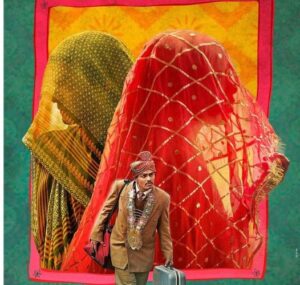Rajkumari Sharma Tankha
Movies like Laapta Ladies come once in a while. Most of the time we are exposed to excesses of sex and nudity when it comes to Bollywood films.
Frankly, I didn’t have a very high opinion of even Laapta Ladies. The film’s title confused me, and when one day I did sit down to watch it, the first few scenes put me off. It reminded me of a Sharat Chandra Chattopadhyay’s story in which the brides get changed when two newly-wed couples travelling in the same boat meet with a storm. Put-off, I logged out of Netflix.
A few days later when we were having dinner, my young college-going daughter began talking about the movie. “I have watched it, mom. It is a very nice movie,” she told me. I told her why I didn’t want to watch it. “They steal old stories and then peddle them as their own,” I answered. A millennial child she, as expected, didn’t know anything about Sharat Chandra, while I grew up reading Sharat Chandra, Rabindranath Tagore and Prem Chand. My Hindi teachers in school were very particular that we read Hindi literature, and to make sure we read, they had kept a day fixed for discussions around the books we read. Before I realised, I was just hooked on to these authors. I don’t know, how many Hindi teachers do that today. Stress is too much on English and other foreign languages. Sad!
Back to the film – “But, mom, you must watch this film. I am sure you will enjoy,” kiddo advised me. So, it was her advice that made me log on to Netflix again. And 15 minutes of watching, I was deeply into it. Such a refreshing tale of women empowerment. You don’t need to shout slogans from the rooftops to empower yourself or your tribe, just small little actions on the ground do the miracle. Kiran Rao wins hands down for her direction.
May be the writer picked up an old idea of a couple getting separated traveling to their home immediately after wedding, but the rest of the story is surely his (Biplab Goswami), and with her screenplay and dialogues, Sneha Desai has done a marvellous job.

The story is centered around two brides – Jaya and Phool – who get lost in the beginning but find themselves by the time the film ends – and they don’t find just their homes but, themselves too.
The main characters – Phool (Nitanshi Goel), Deepak (Sparsh Shrivastava), Jaya (Pratibha Ranta) and Manju Maai (Chhaya Kadam) – have effortlessly essayed their roles. While Kadam is a veteran actor, the rest of the three are rank newcomers. Perhaps, one reason of their magical performance is their fresh faces – you don’t have any expectations, there are no biases, and no pre-disposed conceptions or misconceptions either. The innocence shines through their faces as well as performances.
Deepak is just a regular man, with no exceptional traits. There is no ‘love story’ between him and wife Phool either, but one can feel the deep love that he feels for her through his simple actions and worried looks.
Phool with her strong belief that her day-old husband must be worried and searching for her stands her ground before the much-mature, at times cynical, Manju Maai. She doesn’t fight, doesn’t argue, just stands her ground. So does Jaya, whose role is a bit lengthier and meatier. Strong in her resolve for further studies, she sends across the message on the importance of education for girls. With her behaviour, she not just empowers the women of Deepak’s home, but his parents – educating them about organic farming. Manju Maai has some degree of bitterness in her, but this she uses to empower Phool by instilling in her the importance of being financially independent.
Ravi Kishan as inspector Shyam Manohar
Another character that stands out is Police Inspector Shyam Manohar, essayed by Ravi Kishan. A slippery cop, he has a splendid comic timing and looms large with his character. His is a layered performance, he feels no shame in taking money in return for filing complaints, but is judicious enough not to trouble the innocent. This he shows when helps Jaya get rid of her abusive husband.
One scene that particularly stood out for me was the one where Chotu (Manju Maai’s helper, essayed by Satendra Soni) brings Phool to the room where he and beggar Abdul (Ravi Kapadiya) live. They simply sleep. Phool doesn’t feel scared of sleeping in the same room as two men who are strangers, nor do they show the able-bodied beggar eye Phool. In any other film, they would have shown the girl getting harassed and molested, if not raped. Through this simple scene the films conveys the message that not all men out there are hawks. Most are good-hearted and harbour no evil thoughts about the girls they meet.
The film teaches so many things without being verbose about it like the importance of female bonding (especially between saas-bahu, devrani-jethani), education, being self-reliant. And in a very subtle way it denounces the ghooghat pratha. In fact, the entire film is full of messages, but is not a lecture. A good movie, worth your time. A must-watch, I must say.